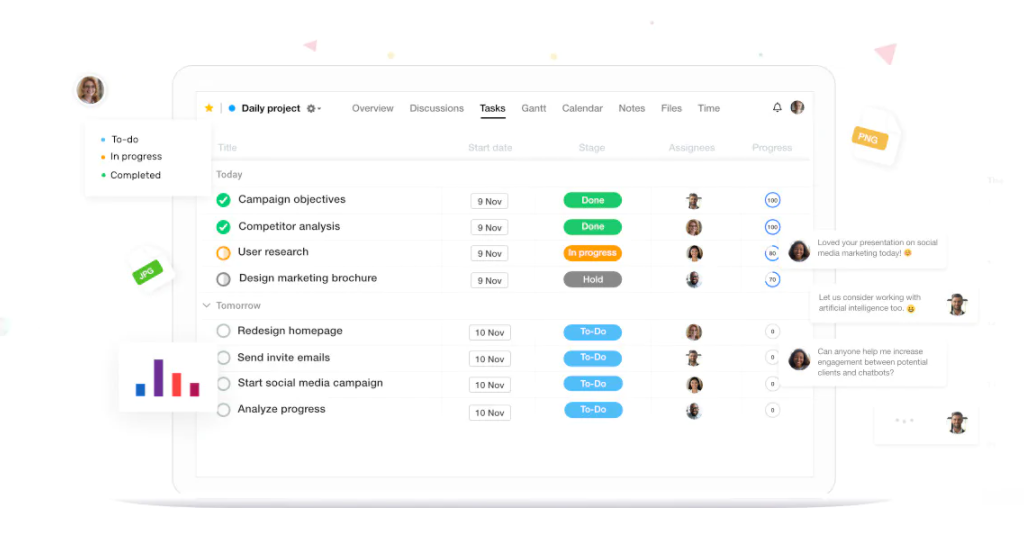For many professionals, COVID-19 has made remote work a necessity rather than a luxury. With the coronavirus looming over our heads for more than two years now, remote work has become a way of life and there seems to be no looking back.
Organizations globally have made remote work a normal way of working. A survey by Owl Labs 16% of organizations globally is fully remote. This goes on to prove that remote work is here to stay and we need to adapt accordingly. Remote work might have some downsides, but it comes with its own set of advantages as well.
Pre-Covid, the majority of employees spent the early portion of their day getting ready for work and then commuting to that location. Choosing what to wear, making sure the kids get to school and then heading out the door for a 30-minute commute each way.
Once employees get to work, they are constantly interrupted by chatty coworkers and pointless meetings. People may feel as if they haven’t accomplished enough towards the end of the workday thanks to office distractions and various other factors. Managing time when in the office can be a challenge and a lack of effective time management can lead to a significant deterioration in your productivity.
Work management and remote work go hand in hand with ProofHub. Sign up NOW and experience the benefits!
How to save time while working remotely
Time management is difficult at any time, but it’s even more difficult when working remotely because you don’t have the same parameters you’re accustomed to in a physical office.
Whether you’re planning to work from home or have already done so, you’re probably thinking about the largest roadblock you’ll encounter. As a beginner remote worker, you might discover that your time management isn’t as great as you thought and that could hamper your productivity.
Working remotely, particularly from home, exposes you to distractions, lack of physical activity, and lack of in-person engagement with colleagues, among other things. As a result, these factors may compound and stifle your production. You may also discover that you are less productive than you were in your previous job.
When you first start working remotely, the most important thing you can do is mentally prepare yourself for what is to come. The secret to making things work and becoming productive while working from home is to have faith in yourself. It is only after you have trust in your abilities that you can manage your time effectively during remote work.
Once you’ve become used to working from home, it’ll be easier for you to focus on your work and give each project you’re all.
To make things easy for you in this write-up, we shall discuss ways to save time while working remotely and thus, enhance your performance.
1. Devise a schedule
Remote work should not be an excuse for you to slip out of your routine and become lazy. Set your alarm clock and go through your typical morning routine as if you were heading to work. When you’re getting ready for the day, it’s a good idea to switch from your comfort space to a proper workspace.
Setting a working schedule for each day and making a to-do list are both recommended. Furthermore, I suggest that you use time blocking aids. Setting blocks for assignments, conferences, and business events is also an efficient time management method.
Plotting a proper schedule is of paramount importance when working remotely as it is one of the prime ways to save time while working remotely. If you and your partner work from home, make a schedule each day or at the beginning of the week to identify who will be working where and when, as well as who will be in charge of any childcare or housework. Whether it’s on a shared calendar tool or scrawled on a piece of paper on the refrigerator, writing it down makes it easier to follow.
If your job and employer allow it, you can also try employing a technique known as “windowed work.” You schedule blocks of time throughout the day for work and personal interests, as opposed to a 9-to-5 schedule.
2. Designate a dedicated workspace

One of the best ways to save your time while working remotely is by working out of a well-organized workspace and limiting distractions. Designate different rooms or regions around the house for each set of expectations, which also includes a dedicated workspace.
Make a workplace for yourself in a different area of your house, or if you’re short on space, find a spot where you can work quietly without being distracted. Set a barrier to letting people in the house know that when you’re working, the location you’ve designated as your home office is off-limits.
Create a separate workplace with everything you’ll need to stay connected and productive. Make sure you know how to use any time management resources provided by your teams, such as collaboration tools and time-tracking apps.
3. Use a time management tool
Another great way to save your time while working remotely is using a time management application. You can choose from an extensive range of tools available to assist people in managing their time adequately. These applications not only help you stay organized, track projects, and meet deadlines, but they also notify you when it’s time to take a break or conclude your workday.
ProofHub is a wonderful project and time management tool that can change the way you work remotely and help you maximize your productivity. ProofHub brings together all of the tools you’ll need to manage time, tasks, project reports, file proofreading, and much more under one roof.
Why should you use ProofHub?
- Assign tasks with the click of a button.
- Create recurring tasks on a daily, weekly, monthly, and annual basis.
- In tasks, include time estimates, labels, and a start and finish date.
- Tasks should be broken down into subtasks.
- Assign files to tasks.
- Keep the tasks private and only give a select person access to them.
- Email in to manage chores from your inbox at any time.
You can manually track time in ProofHub or use timers instead. It provides solutions to queries about task time, projects billable hours, timesheets, and much more.

ProofHub helps remote employees manage their time by:
- To capture time data, create numerous timesheets.
- Set time estimates to see how long it will take to complete the task.
- View all project time data, whether billable or non-billable, as well as project progress.
- Enter the number of hours it took you to complete the assignment.
- Using timers, keep track of how long it takes to complete tasks.
- Use timesheets for customer billing, payroll, estimating, and even time management by exporting them.
- Timesheets from the Time section should be saved and used as needed.
- Make personalized time reports for people and projects.
- Only the people you want to share timesheets with should be able to see them.
A robust time management software like ProofHub can help you keep track of your time and schedule your job. Setting and sticking to personal goals is much easier with such a tool. With visual boards, you can arrange your work more efficiently. For teams that want to make the most of their time, a time management application is a must-have.
Time management tools can help you reach your own objectives and chores, whether it’s effectively charging clients or keeping track of your personal goals and tasks.
4. Avoid multitasking
One of the best ways to save your time while working remotely is by avoiding multitasking and focusing on one task at a time.
Our brain is intended to focus on one thing at a time; therefore, combining it with numerous tasks will undoubtedly result in bad results. You’ll wind up squandering a lot of time and being completely unproductive.
When you multitask, your brain switches from one job to another quickly, which reduces your productivity and, thus, leads to poor time management. When you try to perform two or more tasks simultaneously, it takes longer for each activity to be completed than when you focus on one at a time.
You may believe that multitasking saves you time, yet switching tasks takes your brain at least 15 minutes to refocus. When you multitask on two or more activities, your mind has to shift its concentration, reducing your productivity constantly. Concentrate on one task at a time and move your concentration only when you’ve completed it. You’ll be less distracted, and you might even finish chores faster than you would if you tried to accomplish everything at once.
5. Take frequent breaks
According to a survey conducted by Airtasker, 37% of remote employees take frequent breaks to stay productive and manage their time optimally.
Taking regular breaks while working is a great strategy to keep focused and productive throughout the day. However, poor administration can jeopardize its effectiveness, especially if you take too many breaks.
To manage your stress levels, take regular screen breaks and a lunch break. Taking a break from work to focus on something else, whether it’s a walk or a cup of coffee, will help you be more productive. Try a quick workout if you’re feeling tense and stiff since you’re not moving around as much.
It’s self-evident that you can’t do a large project or work in one sitting; you need to take a break. It’s even better if you have a well-planned break time. Take a walk, perform some brief stretches, or put on headphones and listen to your favorite music – whatever helps you relax and return to work with renewed vigor – but don’t spend more than 10 minutes doing so.
Scheduled breaks can help you stay away from the temptation of leaving your desk too soon. You can choose the exact timing and frequency, but make careful to strike a balance.
Cope with stress, manage distractions, and communicate with your team easily. Make remote work a breeze, sign up on ProofHub TODAY!
6. Reduce distractions
Staying on track is one of the most challenging tasks for people new to working from home. Your house is full of distractions that can take you away from your work at any time, negatively impacting your productivity.
Try to stay away from any devices. It’s incredible how quickly you can become engrossed in them. Even the news on the television can rapidly snare your attention. Similarly, any website you find yourself scrolling through, such as news sites and social media platforms should be avoided.
Social media acts as one of the biggest distractions and that is precisely why you must use your phone only for important purposes throughout your workday. When you’re at work, log out of your social media accounts, so you’re less tempted to use them. You can either delete them from your web browser shortcuts or use a private or “incognito” browser to avoid auto-logging into social media pages.
Other distractions at home include family members especially kids, household chores, visitors, and more. You must set clear boundaries around your working hours and make sure nothing except your own mental health distracts you during the day.
7. Communicate crucial matters

Excellent communication skills are vital at work since they aid in time management and efficiency. As a professional, you are more focused on meeting deadlines when you are able to communicate effectively. You will be able to effectively manage your time as a result of this and thus augment your productivity. Understanding the communication process is critical for increasing efficiency and opening the door to many additional prospects for the firm.
Communication during remote work is also extremely important to keep your mental health in check especially if you’ve not been living with your family. It also helps in establishing a rapport with employees both old and new.
You can set up video conversations or pick up the phone since human interaction is vital for our mental health. If you’re having trouble, talk to your coworkers or your boss, and inquire about how others are doing.
8. Establish a work-life balance
Working from home can cause major burnout and thus, lead to improper management of time and a dip in productivity. According to a recent survey, over 69% of remote workers experience burnout regularly. Another State of Remote Work Survey by Buffer shows that up to 20% of employees feel isolated when working from home.
These statistics are a lesson for remote employees to keep their mental health and work-life balance in check. Maintaining a healthy work-life balance while continuing to contribute effectively and productively to your profession gives you the best of both worlds.
Create a “boundaries agreement” with your team to clarify your expectations for availability, working hours, and reaction times to avoid burnout. To improve collaboration and communication, distribute this to your entire team.
Creating a morning routine, dressing up for work, designating a workspace, communicating with colleagues and friends, a proper work schedule within and out time, taking frequent breaks, and more. As a remote worker, you must understand that you can only be productive and manage your time effectively as long as you establish a clear work-life balance and take care of your mental health.
9. Maintain transparency
Another aspect of managing time effectively is maintaining transparency with your manager and informing them in case of any delays or problems.
Again, if you have family duties competing for your time, the average weekday may not be the most feasible option. You might also notice that you’re more productive during odd hours of the day, such as before the rest of your family wakes up or after supper.
Communicate clearly with your manager about availability and work hour expectations, whether you’re trying to keep to a defined schedule or experimenting with the working when you’re most productive approach.
Manage remote work effectively. Sign up on ProofHub today!
The final word
For many people, working from home may be a fantastic experience. It’s an opportunity to leave the morning commute behind and plan your day in a way that works for you.
However, before you can get the full benefits of working from home, you must first find out how to efficiently manage your time and space. Using the suggestions above to ensure that you have the correct setup in place can help you reduce distractions and boost productivity in your new home office.
Here’s hoping you will have a pleasant experience working from home!
